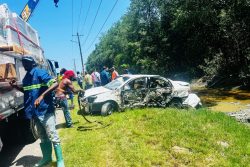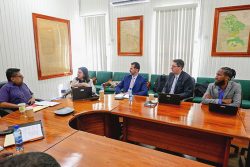-ERC report
Political non-representation for Afro-Guyanese; marginalization and internal conflicts in the community are among the perceived issues affecting their development according to an Ethnic Relations Com-mission (ERC) report that was recently released.
In a few passionate presentations persons spoke of losing contracts that were originally awarded and watching certain villages being upgraded while others have not seen any significant drainage and irrigation work in over thirty years, in addition to the repercussions of the large percentage of Afro-Guyanese money that is tied up in Globe Trust.
Though not speaking on behalf of all Afro-Guyanese, thirteen presenters faced the commission in November 2007 to air what they considered to be the issues affecting Africans in Guyana and offloaded a flood of issues, including the neglect of African villages, prejudices in the awarding of contacts, the promotion of racism in schools and lack of political representation.
The presentations were made publicly and ERC commissioners sought immediate clarification of issues raised on the floor. Last week the report was presented in the National Assembly.
On the issue of marginalization one presenter spoke of the slow development in many Afro-Guyanese populated areas and the marked difference in infrastructure in other areas that have “sprung up” as he described it. Sophia was recalled as being in a state of readiness for regularization since before 1992 with a structure and everything laid out but after being put on hold by the Hoyte administration, it appears to still be on hold, according to the presenter who stated that money is being pumped into other areas while projects in areas such as Sophia, Paradise and Dazell Scheme are being frustrated.
Another presenter said that schools within many African villages are short on staff – staff who he said went to teach in East Indian areas.
“What we find is that our teachers from our villages are going to teach on the estate grounds like Lusignan, Enmore, Success, Chateau Margot, Mon Repos while within the villages, many of the schools are short of staff. We are saying that you should staff our schools with our teachers from within the community and if there is an excess, then they can go to other communities,” the man stated.
He also spoke about not being aware of the rationale for teachers’ placement in schools but stated that what he had observed is affecting African children but on a minimal scale.
Banking
Still on this issue, one presenter said that even in banking prejudices are revealed. He said that if you have a million dollars to carry out a project, the standard banking procedure says that you are allowed 25 to 30% more. According to him, the average African Guyanese entrepreneur was forced to accept less than what those proposals were, adding that persons who want to succeed have their back against the wall and start as a failure. However he blamed African Guyanese who former President Forbes Burnham had put in key positions in financial
institutions as the ones who started inflicting such injuries to their own race.
Internal conflicts in the Afro-Guyanese community exist today according to another presenter who said there are issues of class problems. He said there is an African middle class that has problems with other Africans.
“Whether you want to accept it or not there is that perception that you cannot be accepted to do certain things. We have our own peculiarities and that has to be addressed. I think that you can see it being played out with the AFC and the PNC,” the man said.
He went on to say that the PNCR in opposition offers no political representation for African Guyanese, stating that if they did he would not have been at the forum presenting his views.
One presenter said the time had come for farming to be understood as a business and that Africans need to be educated on this particular issue. He said they must be able to see what are the possibilities that can be derived from the by-products of farming – Agro-processing, marketing potentials and other linkages.
He also advanced arguments that many African villages along the East Coast have not had drainage and irrigation works carried out for nearly thirty years pointing out that at Golden Grove, President’s College took up most of it on their own and now Beterverwagting is doing some work. However the situation needs to be looked into, he said.
Subliminal
messages
School curricula have been promoting racism in schools, according to another presenter who made reference to the subliminal messages in teaching texts which he said portray African people and things African in a negative way. He said education is being used as a vehicle in this regard pointing to text books currently being used in schools mainly at the Caribbean Secondary Certificate Examination (CSEC).
One of the books he mentioned was the Caribbean Certificate History 3 – Development and Decolonisation, which he said shows that the social stratification is according to colour, occupation, political status and social position. The point was argued that such writings can damage the psyche of a particular group.
Other issues raised included the refusal of National Communication Network (NCN) to air African programmes, the need for recognition of the Rastafarian community as a religious and cultural group; repercussions for the African Guyanese community as a result of the delay in reviving Globe Trust operations; need for adequate street lighting, proper drainage and a Community Centre in the Tucville area and discrimination by the army, police and judicial system against African Guyanese.
There were calls for the introduction of a strong remedial programme for school dropouts and for the establishment of a Development Fund. Additionally, there was a call for a revitalization of African Guyanese villages where there is obvious degradation (from George-town to Parika and Georgetown to Rosignol).








